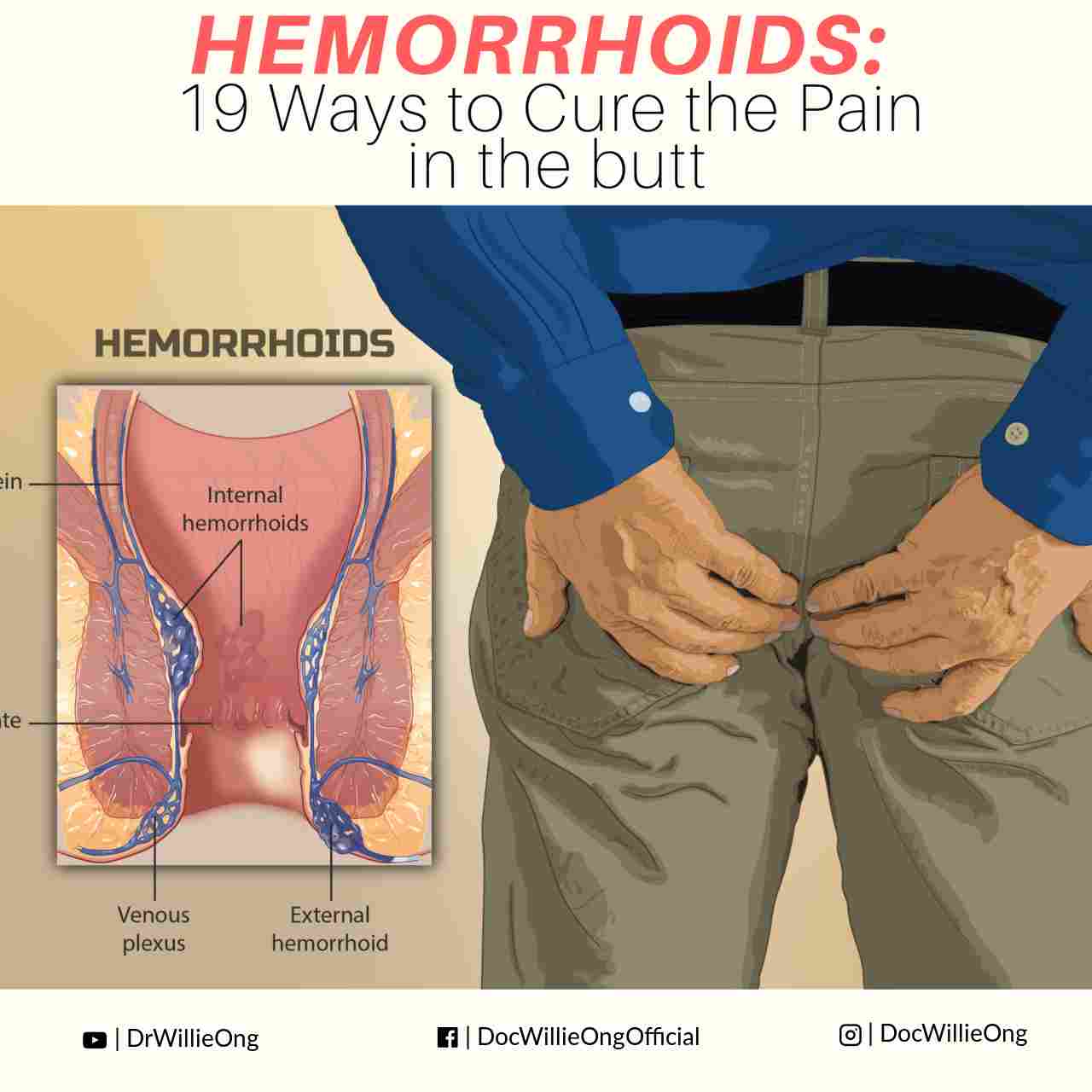Dr. Willie Ong (Internist and Cardiologist)
Q. Dear Doc Willie, Recently, I experienced this pain in my butt. One time, I felt a fleshy material coming out of my anus. What is this? Can you please help? (Joy, 29 years old)
Hemorrhoids (also called piles) is a very common problem affecting people in their twenties and older. Did you know that by the age of 50, almost half of the population will have some form of hemorrhoids?
What are hemorrhoids? Normally, the inside of our anus (the hole where you defecate) has blood vessels surrounding it. However, through years of straining, poor diet, or childbirth, these swollen veins may slowly protrude out of your anus. Those are called hemorrhoids and these may get entangled and bleed when you move your bowels.
Aside from the frightening sight of fresh blood, hemorrhoids can also become excruciatingly painful. At the early stages, hemorrhoids can still retract back inside the anus, but later on, these can be permanently stuck outside the anus.
Who are at risk? First, we can blame our genes. If our parents have hemorrhoids, we are likely to develop it, too. Second, constantly straining can cause hemorrhoids. For women, childbirth and the strain of delivery herald the start of their hemorrhoids problem. Fourth, a diet high in spicy foods can also be irritating to the blood vessels in the anus. Lastly, those people who engage in anal sex are at high risk.
Tips to Prevent and Treat Hemorrhoids:
- Eat high-fiber foods. To soften your stools, eat lots of fruits like papaya, watermelon and grapes, and also high-fiber vegetables like cabbage, kangkong and okra. Try to drink eight to ten glasses of water everyday.
- Don’t rely on certain drugs. Laxative medicines like Bisacodyl tablets are not a cure for constipation. It will help you with one bowel movement, but it will leave you more constipated afterwards.
- Consider fiber supplements (like Metamucil) to soften your stools, especially if you’re not fond of vegetables. However, you need to drink eight glasses of water daily if you take these supplements.
- Lose weight. If you are overweight, there is an increase in the pressure in your abdominal and waist area. This will also translate to more pressure in the veins in the anus.
- Reduce salt intake. Too much salt in your food can lead to swelling of the body, including swelling of the hemorrhoids. Salt is also bad for your blood pressure.
- Avoid spicy and hot foods (as in chili). These spices are irritating to the hemorrhoids. Some doctors say you should also avoid drinking too much coffee, beer and soft drinks.
- Important tip! Avoid straining in the bathroom. Don’t force yourself to defecate when you still don’t feel like it. Try walking and exercising first to facilitate your bowel movement.
- Don’t read newspapers, magazines, and novels while sitting on the toilet bowl waiting for your stools to arrive. Choose to sit on the bowl when you already have a great urge to move your bowels.
- Don’t lift heavy objects. The stress of lifting heavy objects is equivalent to the stress of straining in the bathroom.
- Avoid sitting or standing too long, because this will place increasing pressure on the hemorrhoids. Sit and stand alternately throughout the day.
- Try using petroleum jelly. According to Dr. Edmund Leff, a colon and rectal surgeon, you can try applying some petroleum jelly around the anus before you defecate. This can help smoothen the passage of hard stools, and hopefully avoid injuring the hemorrhoids.
- Never use dry tissue paper. Use very wet tissue or running water to wash yourself after moving your bowels. Scraping with rough paper can make the hemorrhoids bleed.
- Keep your anal area clean. Clean yourself meticulously so as not to infect the hemorrhoids. A bacterial infection can lead to an abscess in the anal area. Be clean and careful, too.
- Don’t scratch it. Sometimes hemorrhoids can be itchy, but try to avoid the urge to scratch it.
- If you’re pregnant, lie on your left side often. According to Dr. Lewis Townsend, an obstetrician, the enlarging uterus may impinge on the blood vessels of the hemorrhoids. To lessen the pressure, Dr. Townsend advises pregnant women to lie on their left side for 20 minutes every five hours or so.
- Soak in a warm tub or basin. Fill a bathtub with 6 to 12 inches of lukewarm water. Then, sit on the bathtub with your knees raised. Do this several times a day. According to Dr. Byron Gathright, a colorectal surgeon, the lukewarm water improves blood flow in the area and reduces pain and swelling. If you don’t have a bathtub, try using a large basin. You can also buy a hot sitz bath from a medical equipment store.
- Alternately, you can try an ice pack. If the hemorrhoids are itchy or painful, placing an ice pack beside it may reduce the symptoms. Wrap a towel around the ice pack so it won’t be too cold. Apply the ice pack for a maximum of 20 minutes, three times a day. Don’t overdo it.
- Consider some creams. There are ointments and suppositories available such as Proctosedyl or Ultraproct. These won’t cure your hemorrhoids but it can numb the pain. Don’t use these for more than a week.
- Try gently pushing the hemorrhoids inside. According to Dr. Townsend, if the hemorrhoids are not too big, you may still try to push it inside the anus. This will lessen the risk of injury and bleeding.
When should you see a surgeon? There are certain situations to watch out for: (1) If there is any sudden increase in pain; (2) if you feel any new mass in the area, which could be a wart or an abscess; and (3) if there is a non-healing wound in the area. Although we usually blame hemorrhoids as the cause for bloody stools, you should also consult a surgeon to make sure there are no other serious causes.
Of course, if your hemorrhoids are bothering you (because of its size or pain), you need to see a doctor. Don’t worry. Surgical procedures for hemorrhoids are simple and safe. Trust your surgeon. I do.



